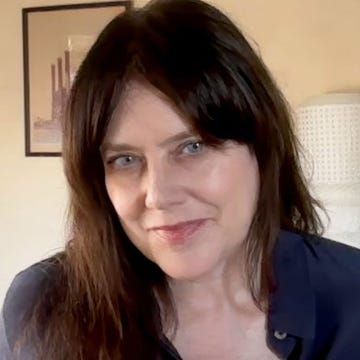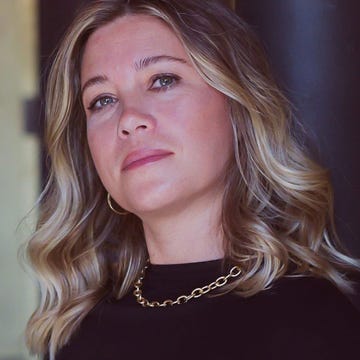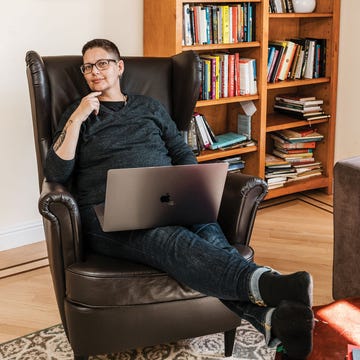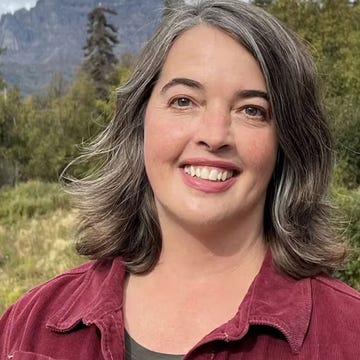Before she began publishing fiction, the formidable novelist Francine Prose was interested in ghost stories—her first memoir, 1974: A Personal History, after a career of more than 50 years and more than 30 books, is a mesmerizing, gut-wrenching one. Between 1972 and 1975, when Prose was in her mid-20s and newly divorced, she lived for months at a stretch in San Francisco, where she’d gone to get as far away from Cambridge, Massachusetts, as she could. She’d picked the place because, she says, “I was full of Vertigo. It’s still my favorite movie.”
In 1974, Prose mentions a scene in the 1958 film where the main character, John “Scottie” Ferguson, a tortured private investigator, and Gavin Elster, the rich man who hires Ferguson to tail his wife, have a rueful conversation. Elster says, “The things that spell San Francisco to me are disappearing fast.... I’d like to have lived here then. The color and excitement, the power, the freedom.” Likewise, the San Francisco that Prose encountered was not the San Francisco of Vertigo, and late in the book, she expresses sadness that the San Francisco she encountered in the 1970s is also gone. San Francisco is always already spectral.
Prose speaks to me over Zoom from New York from a well-lit room with a ceiling-high bookshelf and a printer. “It was an incredibly romantic city,” she says. Hope had been generated by the Diggers, an anarchist street-theater group based in the Haight-Ashbury, and the Black Panthers, before they began to be killed; the place seemed to her a ground zero for what had happened and what was about to happen in the culture. Later, when I note her encapsulation of a fluctuating reverence for counterculture and suggest that it’s cool once again to protest, she says, “Now, the idea that there’s something you can do, and there’s something you can protest, that you have a voice, is more important than ever, because we’re about to be really, really up against it [politically].”
The friends she stayed with introduced her to the troubled whistleblower Anthony J. Russo, or Tony, whom she became fascinated by. He’d worked for the RAND corporation and together with Daniel Ellsberg leaked the Pentagon Papers, which revealed to the misled public that the United States had quietly increased its involvement in Vietnam for purposes of power, not aid. She tells me, “One of the reasons I was so drawn to him was he was willing to give up everything—and did. He could have been a super successful aeronautical space engineer. He had this huge career, and then he went to Vietnam, and he couldn’t live with it, and he changed his life to try and stop it.”
The two would drive around San Francisco together, and he would talk at her about what had happened to him, and in the book, she writes, “He had every reason to suspect that he was under surveillance, and he drove like someone trying to elude whoever was pursuing him.” Prose admits of those times with Russo that “there were several points at which I should have been frightened, but I wasn’t.” On their first date, they stood on the edge of the Sutro Baths in Land’s End, which she calls a hole in the ground, and even though she didn’t know this unstable man, she shrugged off potential risks. “So much of the book, to me, is about being that age, about what it’s like to be that age, and how reckless in a way you are, and irresponsible in a kind of way that you don’t even know.”
Russo comes to life in part because of a memorable specificity, though Prose doesn’t consider herself someone with a good memory. She elaborates, “Once you start remembering things, other things come back to you. As I remembered him eating the sausage mashed up with the blueberry pie in the cafeteria, all this stuff started coming back. Memory is so strange anyway, but I could hear his voice. Also, there are film clips of him out there, so I could hear the rhythm of the speech.”
Russo is not the only apparition here—Prose is equally haunted by her younger self. The younger Prose she creates on the page is as vivid as the characters in her novels, from Blue Angel to The Vixen; she’s curious and open-minded and searching but also grievously uncertain, not yet in possession of her true north.
Prose muses, “I think I’m probably more forgiving to my characters than I was to myself writing this, you know? Because there were many points at which I thought, God, she was so stupid, and then I remembered it was me. So I had to recalibrate.” Exposing the flawed behavior of her earlier, younger self didn’t frighten her—Prose is self-composed, merciless, as she talks about the other, distant Prose. When Prose’s husband, the artist Howie Michaels, who is her first reader, considered an early draft, he remarked that Prose would have to like herself more than she did.
Toward the end of the memoir, Russo has a horrifying meltdown. In that crisis, Prose couldn’t tolerate what was happening—her own “psychic survival seemed so shaky”—and ran away. She says of the written account, “I could have lied, you know? I could have said I stayed there, I helped him, I made sure he was in good hands because whatever else was going on, he was my friend.... Maybe there was just a little edge of resentment of the fact that he was the one that had always done all the talking.” If one of her friends was melting down in public, the self she is now would not be “out the back door.”
Prose’s writing practice has shifted with different parts of her life, but in 1974, despite publishing one book, with another on the way, she didn’t consider herself to be accumulating material, certainly not for a memoir. Russo might have affected her subsequent fiction, though—she identifies her predilection for writing rants “where characters go nuts—like talks and talks and talks and talks and you have only minimal sense of what they’re saying.”
I question whether, while absorbing San Francisco in 1974, she was writing, in a way. Alluding to Muriel Spark’s Loitering with Intent, in which a struggling writer learns that portions of her first novel are coming true, Prose responds, “It’s so mysterious because there’s a way in which the world gives you what you need.” Her favorite of her novels, Mister Monkey, came about because she’d taken her granddaughter to an off-Broadway show—costumes were falling apart, the lighting guy couldn’t find the characters, and her granddaughter asked, in an unexpected lull, if she was interested in this. She answered, “You bet.” She says, “I felt like I wrote the novel just so I wouldn’t have lied to her about being interested in the world’s most low-budget children’s musical.”
Is there a difference, then, between working in memoir and fiction? The author acknowledges that she’s not sure of the balance between imagination and observation. She is currently finishing a novel with historical figures, characters who surprise her, and she says, “There’s a certain amount you can’t know about people. Their behavior is not sensible or moral. I think that came home to me in a very direct and personal way with the memoir. I am not the hero of that moment.” Yet, she says, her granddaughters are now teenagers, and she notices things that make her more forgiving of herself, concluding that there’s “stuff you’ve got to do to be a person.”
As with her novels, Prose pushed past ruminations like “Am I saying too much? Is this embarrassing? What a horrible [person] I was” by trying to make sentences right, finding one perfect word. Her voice brightens. “There’s nothing like it. It’s pure happiness.”•
Join us on June 20 at 5 p.m. Pacific time, when Javier Zamora will sit down with CBC host John Freeman and special guest Ingrid Rojas Contreras to discuss Solito. Register for the Zoom conversation here.













